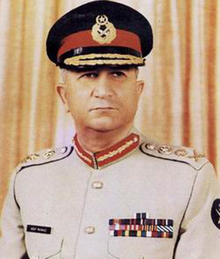
Back اسيف ناواز ARZ Asif Nawaz French Наваз, Асиф Russian آصف نواز جنجوعا Sindhi Asif Nawaz Slovenian آصف نواز جنجوعہ Urdu 阿西夫·纳瓦兹 Chinese
Asif Nawaz Janjua | |
|---|---|
 | |
| 4th Chief of Army Staff | |
| In office 16 August 1991 – 8 January 1993 | |
| President | Ghulam Ishaq Khan |
| Prime Minister | Nawaz Sharif |
| Preceded by | Mirza Aslam Beg |
| Succeeded by | Abdul Waheed Kakar |
| Personal details | |
| Born | Asif Nawaz Janjua 3 January 1937 Chakri Rajgan, Jhelum District, Punjab Province |
| Died | 8 January 1993 (aged 56) Rawalpindi Cantonment, Punjab, Pakistan |
| Cause of death | Cardiac arrest |
| Relatives |
|
| Alma mater | |
| Nickname | Soldier's Soldier |
| Military service | |
| Branch/service | |
| Years of service | 1955–93 |
| Rank | |
| Unit | 5th Punjab Regiment |
| Commands | Chief of General Staff (Pakistan) V Corps (Pakistan) Commandant PMA Kakul 7th Infantry Division (Pakistan) Chief of Staff II Corps (Pakistan) |
| Battles/wars | |
| Awards | Nishan-e-Imtiaz (Military) Hilal-i-Imtiaz(Military) Sitara-e-Basalat with BAR Sword of Honour |
General Asif Nawaz Janjua[a] (3 January 1937 – 8 January 1993) was an officer in the Pakistan Army, serving as its fourth Chief of Army Staff from 16 August 1991 until his untimely death in 1993. His tenure is regarded as contributing to civilian control over the Pakistan Armed Forces. Janjua was one of only four high-ranking officers to have died in active service, alongside Admiral Hasan Hafeez Ahmed (1975), General Zia-ul-Haq (1988), and Air Chief Marshal Mushaf Ali Mir (2002).
His unexpected death was initially surrounded by uncertainty, with some speculating foul play after high levels of arsenic poisoning were detected in his body. His family requested further investigations, including the exhumation of his body and an autopsy conducted with the assistance of international experts from France, Britain, and the United States. Despite early suspicions, the cause of death was ultimately determined to be a heart attack.
Born in the Jhelum District of Punjab Province, Janjua came from a Punjabi Janjua Rajput family. He was educated at St Mary's Cambridge School and later received military training at the Pakistan Military Academy and the Royal Military Academy Sandhurst. Throughout his career, he was recognized for his discipline and leadership, culminating in the award of the Sword of Honour at Sandhurst.
During his military career, Janjua participated in the Indo-Pakistani War of 1965 and the Indo-Pakistani War of 1971, where he was involved in key battles such as the Battle of Chamb. He progressed through the ranks, holding various significant positions, including Chief of General Staff and Corps Commander of V Corps. He played a role in overseeing military operations, particularly in Karachi and Sindh, during a period of rising instability in the country.
- ^ "'Pakistan's armed forces second to none'". DailyTimes. Archived from the original on 9 March 2016. Retrieved 8 March 2016.
Cite error: There are <ref group=lower-alpha> tags or {{efn}} templates on this page, but the references will not show without a {{reflist|group=lower-alpha}} template or {{notelist}} template (see the help page).